Analysis of Small Business Management and Entrepreneurship
VerifiedAdded on 2020/07/23
|13
|4205
|40
AI Summary
The assignment provided requires students to analyze the topic of small business management and entrepreneurship. It includes references to various books and journals that discuss aspects such as business growth, social responsibility, and international entrepreneurship. Students are expected to understand the dynamics of entrepreneurship through framework approaches and explore the cognitive drivers of small business managers' intentions to adopt business model change. The assignment also touches on the prevalence and determinants of social entrepreneurship at the macro level and preference for self-employment in new business start-ups.
Contribute Materials
Your contribution can guide someone’s learning journey. Share your
documents today.

ENTREPRENEURSHIP
AND SMALL-BUSINESS
MANAGEMENT
AND SMALL-BUSINESS
MANAGEMENT
Secure Best Marks with AI Grader
Need help grading? Try our AI Grader for instant feedback on your assignments.

Table of Contents
INTRODUCTION.........................................................................................................................................3
TASK 1..........................................................................................................................................................4
P1 Entrepreneurial ventures and their relation to the typologies..............................................................4
P2 Similarities and differences between entrepreneurial ventures...........................................................5
TASK 3..........................................................................................................................................................7
P3 Micro factors impact and small business on the economy..................................................................7
P4 Importance and contribution of small business and business start ups in the growth of social
economy....................................................................................................................................................8
TASK 4..........................................................................................................................................................9
P5 Traits and characteristics of a successful entrepreneur........................................................................9
P6Aspects of the entrepreneurial personality, reflect entrepreneurial motivation and mind-set............10
TASK 5........................................................................................................................................................11
P7 How background and experience can foster or hinder entrepreneurship..........................................11
Conclusion...................................................................................................................................................12
REFERENCES.............................................................................................................................................12
INTRODUCTION.........................................................................................................................................3
TASK 1..........................................................................................................................................................4
P1 Entrepreneurial ventures and their relation to the typologies..............................................................4
P2 Similarities and differences between entrepreneurial ventures...........................................................5
TASK 3..........................................................................................................................................................7
P3 Micro factors impact and small business on the economy..................................................................7
P4 Importance and contribution of small business and business start ups in the growth of social
economy....................................................................................................................................................8
TASK 4..........................................................................................................................................................9
P5 Traits and characteristics of a successful entrepreneur........................................................................9
P6Aspects of the entrepreneurial personality, reflect entrepreneurial motivation and mind-set............10
TASK 5........................................................................................................................................................11
P7 How background and experience can foster or hinder entrepreneurship..........................................11
Conclusion...................................................................................................................................................12
REFERENCES.............................................................................................................................................12
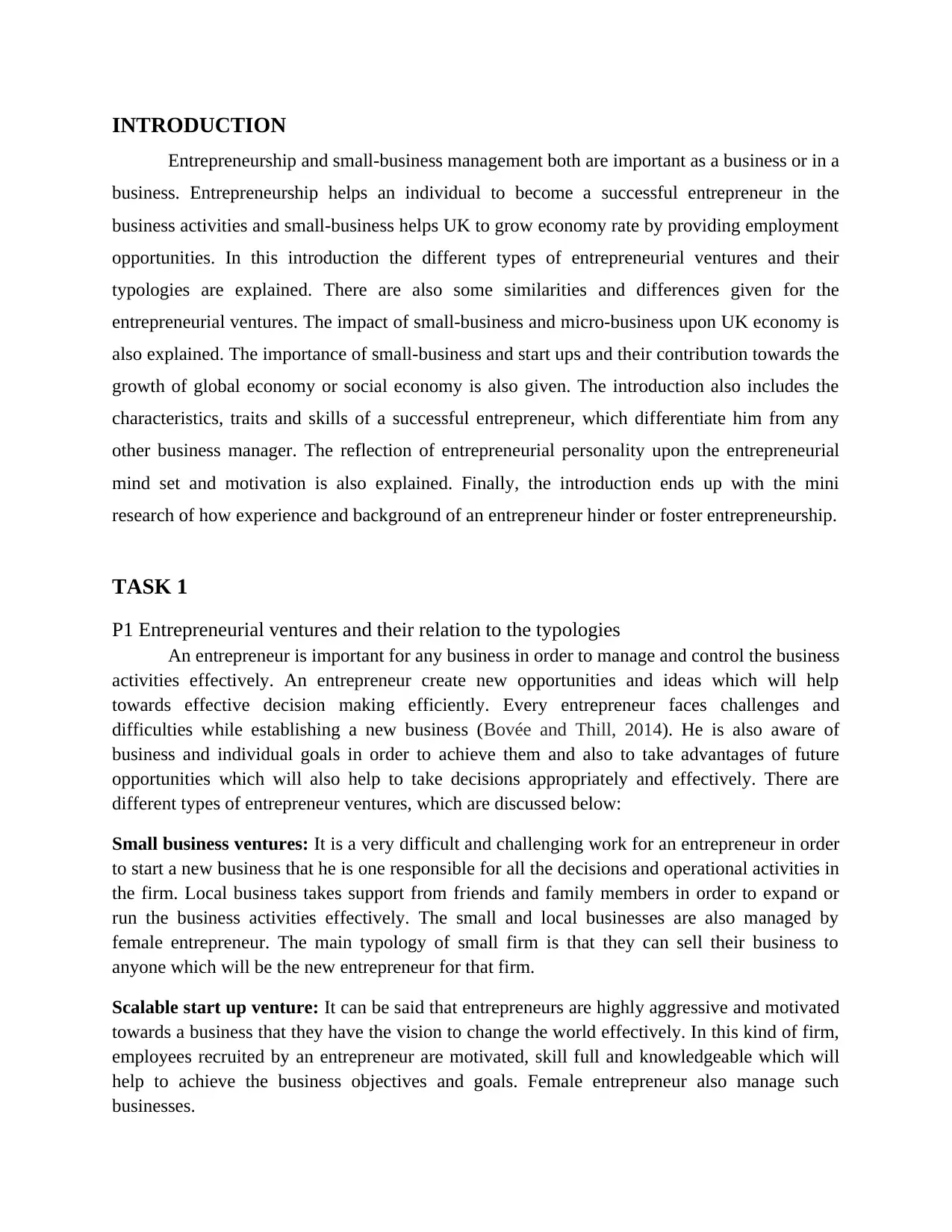
INTRODUCTION
Entrepreneurship and small-business management both are important as a business or in a
business. Entrepreneurship helps an individual to become a successful entrepreneur in the
business activities and small-business helps UK to grow economy rate by providing employment
opportunities. In this introduction the different types of entrepreneurial ventures and their
typologies are explained. There are also some similarities and differences given for the
entrepreneurial ventures. The impact of small-business and micro-business upon UK economy is
also explained. The importance of small-business and start ups and their contribution towards the
growth of global economy or social economy is also given. The introduction also includes the
characteristics, traits and skills of a successful entrepreneur, which differentiate him from any
other business manager. The reflection of entrepreneurial personality upon the entrepreneurial
mind set and motivation is also explained. Finally, the introduction ends up with the mini
research of how experience and background of an entrepreneur hinder or foster entrepreneurship.
TASK 1
P1 Entrepreneurial ventures and their relation to the typologies
An entrepreneur is important for any business in order to manage and control the business
activities effectively. An entrepreneur create new opportunities and ideas which will help
towards effective decision making efficiently. Every entrepreneur faces challenges and
difficulties while establishing a new business (Bovée and Thill, 2014). He is also aware of
business and individual goals in order to achieve them and also to take advantages of future
opportunities which will also help to take decisions appropriately and effectively. There are
different types of entrepreneur ventures, which are discussed below:
Small business ventures: It is a very difficult and challenging work for an entrepreneur in order
to start a new business that he is one responsible for all the decisions and operational activities in
the firm. Local business takes support from friends and family members in order to expand or
run the business activities effectively. The small and local businesses are also managed by
female entrepreneur. The main typology of small firm is that they can sell their business to
anyone which will be the new entrepreneur for that firm.
Scalable start up venture: It can be said that entrepreneurs are highly aggressive and motivated
towards a business that they have the vision to change the world effectively. In this kind of firm,
employees recruited by an entrepreneur are motivated, skill full and knowledgeable which will
help to achieve the business objectives and goals. Female entrepreneur also manage such
businesses.
Entrepreneurship and small-business management both are important as a business or in a
business. Entrepreneurship helps an individual to become a successful entrepreneur in the
business activities and small-business helps UK to grow economy rate by providing employment
opportunities. In this introduction the different types of entrepreneurial ventures and their
typologies are explained. There are also some similarities and differences given for the
entrepreneurial ventures. The impact of small-business and micro-business upon UK economy is
also explained. The importance of small-business and start ups and their contribution towards the
growth of global economy or social economy is also given. The introduction also includes the
characteristics, traits and skills of a successful entrepreneur, which differentiate him from any
other business manager. The reflection of entrepreneurial personality upon the entrepreneurial
mind set and motivation is also explained. Finally, the introduction ends up with the mini
research of how experience and background of an entrepreneur hinder or foster entrepreneurship.
TASK 1
P1 Entrepreneurial ventures and their relation to the typologies
An entrepreneur is important for any business in order to manage and control the business
activities effectively. An entrepreneur create new opportunities and ideas which will help
towards effective decision making efficiently. Every entrepreneur faces challenges and
difficulties while establishing a new business (Bovée and Thill, 2014). He is also aware of
business and individual goals in order to achieve them and also to take advantages of future
opportunities which will also help to take decisions appropriately and effectively. There are
different types of entrepreneur ventures, which are discussed below:
Small business ventures: It is a very difficult and challenging work for an entrepreneur in order
to start a new business that he is one responsible for all the decisions and operational activities in
the firm. Local business takes support from friends and family members in order to expand or
run the business activities effectively. The small and local businesses are also managed by
female entrepreneur. The main typology of small firm is that they can sell their business to
anyone which will be the new entrepreneur for that firm.
Scalable start up venture: It can be said that entrepreneurs are highly aggressive and motivated
towards a business that they have the vision to change the world effectively. In this kind of firm,
employees recruited by an entrepreneur are motivated, skill full and knowledgeable which will
help to achieve the business objectives and goals. Female entrepreneur also manage such
businesses.
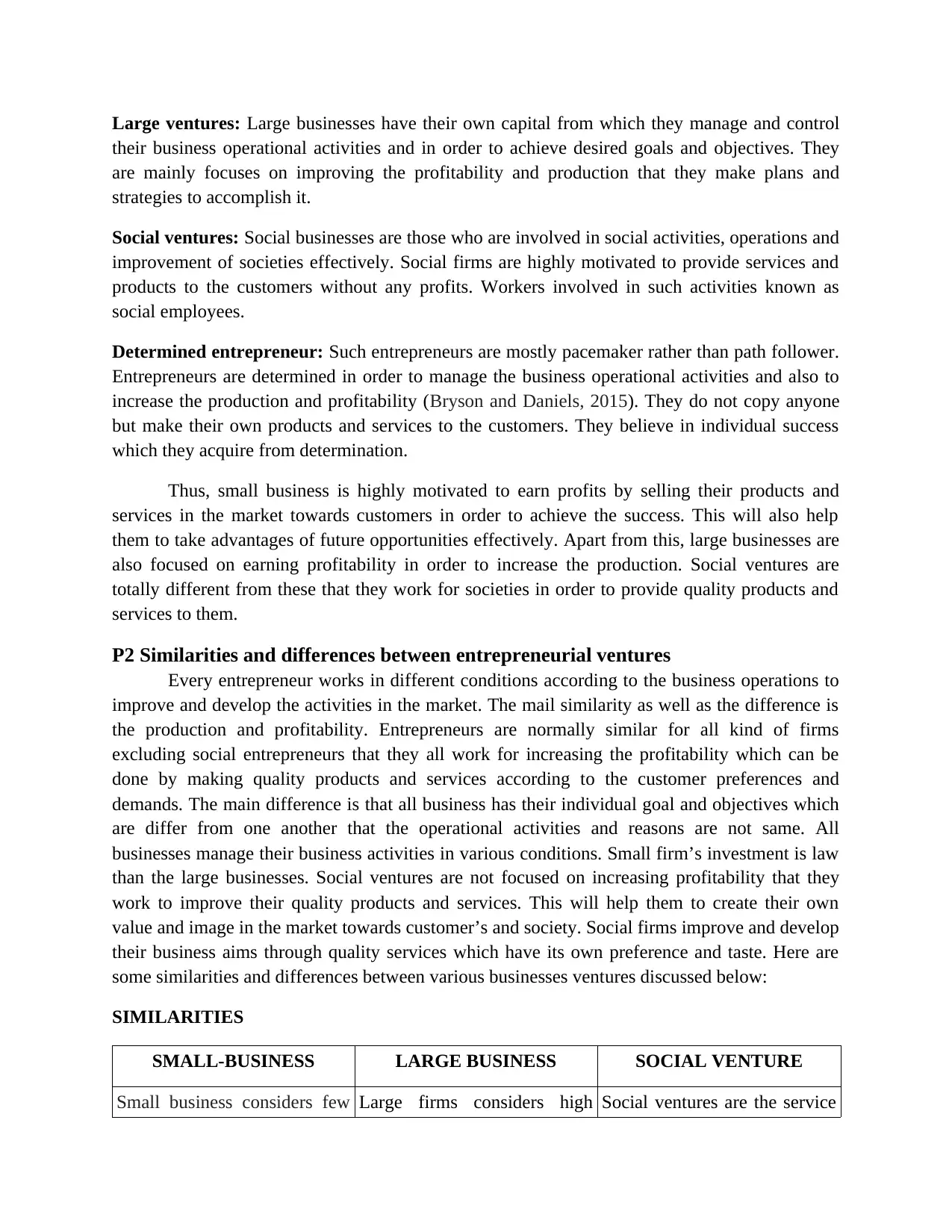
Large ventures: Large businesses have their own capital from which they manage and control
their business operational activities and in order to achieve desired goals and objectives. They
are mainly focuses on improving the profitability and production that they make plans and
strategies to accomplish it.
Social ventures: Social businesses are those who are involved in social activities, operations and
improvement of societies effectively. Social firms are highly motivated to provide services and
products to the customers without any profits. Workers involved in such activities known as
social employees.
Determined entrepreneur: Such entrepreneurs are mostly pacemaker rather than path follower.
Entrepreneurs are determined in order to manage the business operational activities and also to
increase the production and profitability (Bryson and Daniels, 2015). They do not copy anyone
but make their own products and services to the customers. They believe in individual success
which they acquire from determination.
Thus, small business is highly motivated to earn profits by selling their products and
services in the market towards customers in order to achieve the success. This will also help
them to take advantages of future opportunities effectively. Apart from this, large businesses are
also focused on earning profitability in order to increase the production. Social ventures are
totally different from these that they work for societies in order to provide quality products and
services to them.
P2 Similarities and differences between entrepreneurial ventures
Every entrepreneur works in different conditions according to the business operations to
improve and develop the activities in the market. The mail similarity as well as the difference is
the production and profitability. Entrepreneurs are normally similar for all kind of firms
excluding social entrepreneurs that they all work for increasing the profitability which can be
done by making quality products and services according to the customer preferences and
demands. The main difference is that all business has their individual goal and objectives which
are differ from one another that the operational activities and reasons are not same. All
businesses manage their business activities in various conditions. Small firm’s investment is law
than the large businesses. Social ventures are not focused on increasing profitability that they
work to improve their quality products and services. This will help them to create their own
value and image in the market towards customer’s and society. Social firms improve and develop
their business aims through quality services which have its own preference and taste. Here are
some similarities and differences between various businesses ventures discussed below:
SIMILARITIES
SMALL-BUSINESS LARGE BUSINESS SOCIAL VENTURE
Small business considers few Large firms considers high Social ventures are the service
their business operational activities and in order to achieve desired goals and objectives. They
are mainly focuses on improving the profitability and production that they make plans and
strategies to accomplish it.
Social ventures: Social businesses are those who are involved in social activities, operations and
improvement of societies effectively. Social firms are highly motivated to provide services and
products to the customers without any profits. Workers involved in such activities known as
social employees.
Determined entrepreneur: Such entrepreneurs are mostly pacemaker rather than path follower.
Entrepreneurs are determined in order to manage the business operational activities and also to
increase the production and profitability (Bryson and Daniels, 2015). They do not copy anyone
but make their own products and services to the customers. They believe in individual success
which they acquire from determination.
Thus, small business is highly motivated to earn profits by selling their products and
services in the market towards customers in order to achieve the success. This will also help
them to take advantages of future opportunities effectively. Apart from this, large businesses are
also focused on earning profitability in order to increase the production. Social ventures are
totally different from these that they work for societies in order to provide quality products and
services to them.
P2 Similarities and differences between entrepreneurial ventures
Every entrepreneur works in different conditions according to the business operations to
improve and develop the activities in the market. The mail similarity as well as the difference is
the production and profitability. Entrepreneurs are normally similar for all kind of firms
excluding social entrepreneurs that they all work for increasing the profitability which can be
done by making quality products and services according to the customer preferences and
demands. The main difference is that all business has their individual goal and objectives which
are differ from one another that the operational activities and reasons are not same. All
businesses manage their business activities in various conditions. Small firm’s investment is law
than the large businesses. Social ventures are not focused on increasing profitability that they
work to improve their quality products and services. This will help them to create their own
value and image in the market towards customer’s and society. Social firms improve and develop
their business aims through quality services which have its own preference and taste. Here are
some similarities and differences between various businesses ventures discussed below:
SIMILARITIES
SMALL-BUSINESS LARGE BUSINESS SOCIAL VENTURE
Small business considers few Large firms considers high Social ventures are the service
Secure Best Marks with AI Grader
Need help grading? Try our AI Grader for instant feedback on your assignments.
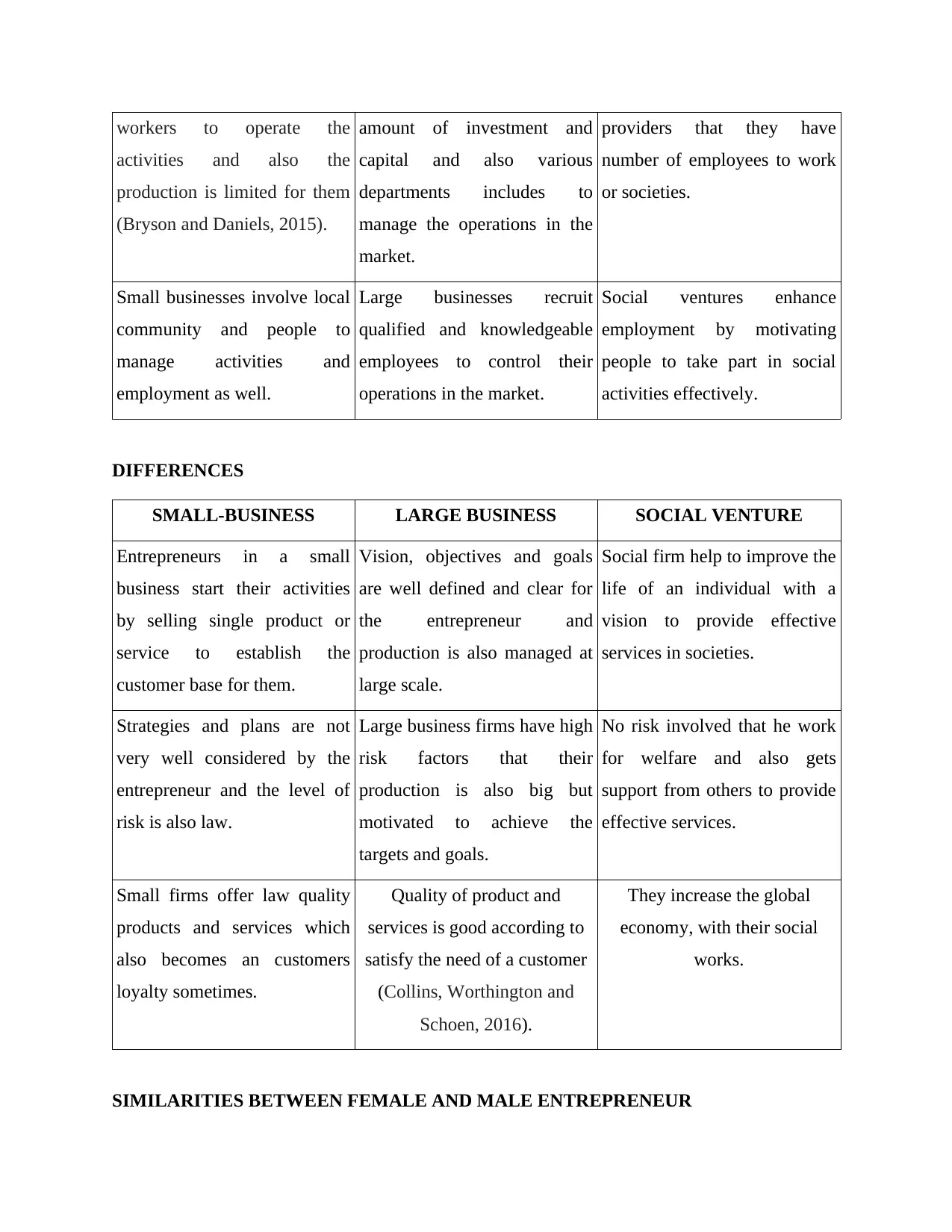
workers to operate the
activities and also the
production is limited for them
(Bryson and Daniels, 2015).
amount of investment and
capital and also various
departments includes to
manage the operations in the
market.
providers that they have
number of employees to work
or societies.
Small businesses involve local
community and people to
manage activities and
employment as well.
Large businesses recruit
qualified and knowledgeable
employees to control their
operations in the market.
Social ventures enhance
employment by motivating
people to take part in social
activities effectively.
DIFFERENCES
SMALL-BUSINESS LARGE BUSINESS SOCIAL VENTURE
Entrepreneurs in a small
business start their activities
by selling single product or
service to establish the
customer base for them.
Vision, objectives and goals
are well defined and clear for
the entrepreneur and
production is also managed at
large scale.
Social firm help to improve the
life of an individual with a
vision to provide effective
services in societies.
Strategies and plans are not
very well considered by the
entrepreneur and the level of
risk is also law.
Large business firms have high
risk factors that their
production is also big but
motivated to achieve the
targets and goals.
No risk involved that he work
for welfare and also gets
support from others to provide
effective services.
Small firms offer law quality
products and services which
also becomes an customers
loyalty sometimes.
Quality of product and
services is good according to
satisfy the need of a customer
(Collins, Worthington and
Schoen, 2016).
They increase the global
economy, with their social
works.
SIMILARITIES BETWEEN FEMALE AND MALE ENTREPRENEUR
activities and also the
production is limited for them
(Bryson and Daniels, 2015).
amount of investment and
capital and also various
departments includes to
manage the operations in the
market.
providers that they have
number of employees to work
or societies.
Small businesses involve local
community and people to
manage activities and
employment as well.
Large businesses recruit
qualified and knowledgeable
employees to control their
operations in the market.
Social ventures enhance
employment by motivating
people to take part in social
activities effectively.
DIFFERENCES
SMALL-BUSINESS LARGE BUSINESS SOCIAL VENTURE
Entrepreneurs in a small
business start their activities
by selling single product or
service to establish the
customer base for them.
Vision, objectives and goals
are well defined and clear for
the entrepreneur and
production is also managed at
large scale.
Social firm help to improve the
life of an individual with a
vision to provide effective
services in societies.
Strategies and plans are not
very well considered by the
entrepreneur and the level of
risk is also law.
Large business firms have high
risk factors that their
production is also big but
motivated to achieve the
targets and goals.
No risk involved that he work
for welfare and also gets
support from others to provide
effective services.
Small firms offer law quality
products and services which
also becomes an customers
loyalty sometimes.
Quality of product and
services is good according to
satisfy the need of a customer
(Collins, Worthington and
Schoen, 2016).
They increase the global
economy, with their social
works.
SIMILARITIES BETWEEN FEMALE AND MALE ENTREPRENEUR
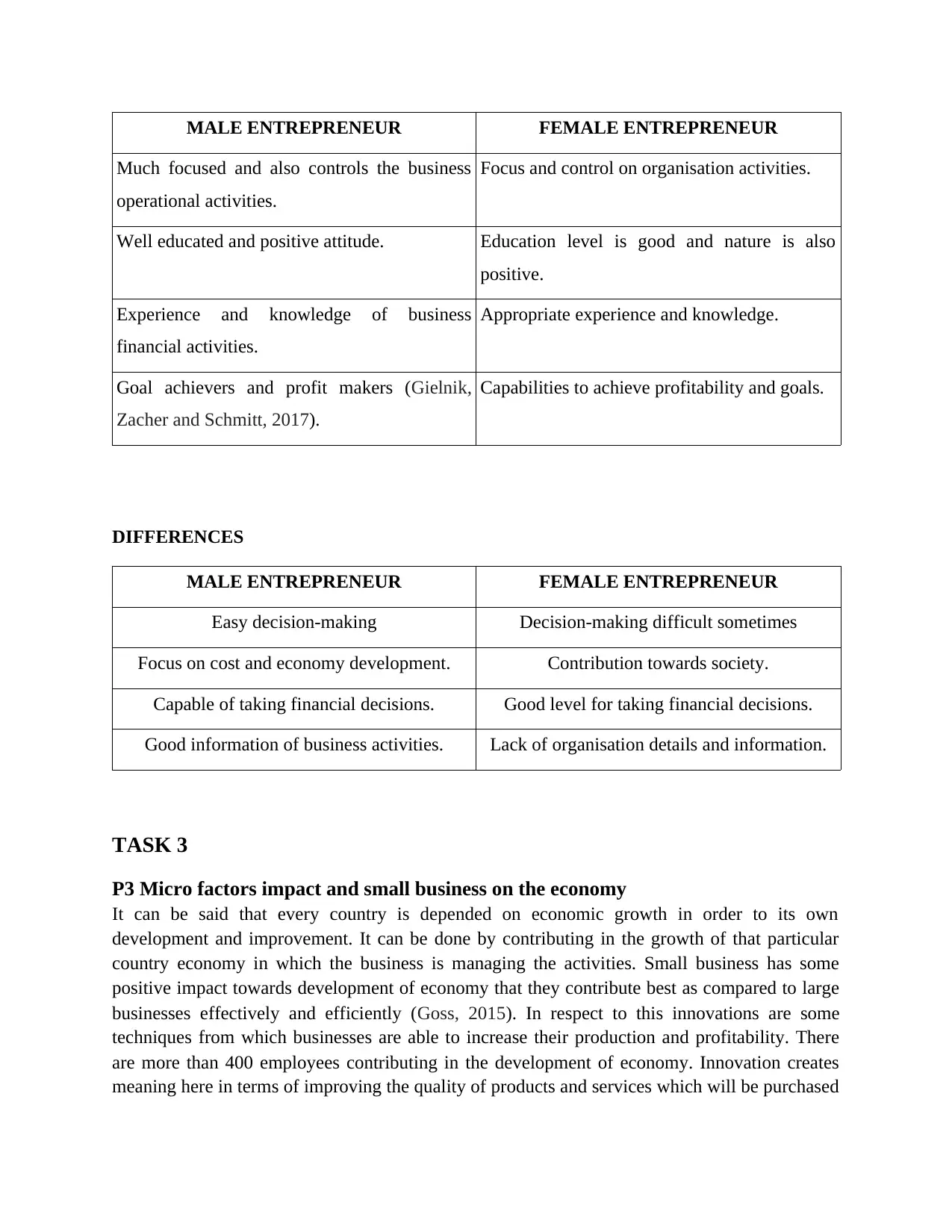
MALE ENTREPRENEUR FEMALE ENTREPRENEUR
Much focused and also controls the business
operational activities.
Focus and control on organisation activities.
Well educated and positive attitude. Education level is good and nature is also
positive.
Experience and knowledge of business
financial activities.
Appropriate experience and knowledge.
Goal achievers and profit makers (Gielnik,
Zacher and Schmitt, 2017).
Capabilities to achieve profitability and goals.
DIFFERENCES
MALE ENTREPRENEUR FEMALE ENTREPRENEUR
Easy decision-making Decision-making difficult sometimes
Focus on cost and economy development. Contribution towards society.
Capable of taking financial decisions. Good level for taking financial decisions.
Good information of business activities. Lack of organisation details and information.
TASK 3
P3 Micro factors impact and small business on the economy
It can be said that every country is depended on economic growth in order to its own
development and improvement. It can be done by contributing in the growth of that particular
country economy in which the business is managing the activities. Small business has some
positive impact towards development of economy that they contribute best as compared to large
businesses effectively and efficiently (Goss, 2015). In respect to this innovations are some
techniques from which businesses are able to increase their production and profitability. There
are more than 400 employees contributing in the development of economy. Innovation creates
meaning here in terms of improving the quality of products and services which will be purchased
Much focused and also controls the business
operational activities.
Focus and control on organisation activities.
Well educated and positive attitude. Education level is good and nature is also
positive.
Experience and knowledge of business
financial activities.
Appropriate experience and knowledge.
Goal achievers and profit makers (Gielnik,
Zacher and Schmitt, 2017).
Capabilities to achieve profitability and goals.
DIFFERENCES
MALE ENTREPRENEUR FEMALE ENTREPRENEUR
Easy decision-making Decision-making difficult sometimes
Focus on cost and economy development. Contribution towards society.
Capable of taking financial decisions. Good level for taking financial decisions.
Good information of business activities. Lack of organisation details and information.
TASK 3
P3 Micro factors impact and small business on the economy
It can be said that every country is depended on economic growth in order to its own
development and improvement. It can be done by contributing in the growth of that particular
country economy in which the business is managing the activities. Small business has some
positive impact towards development of economy that they contribute best as compared to large
businesses effectively and efficiently (Goss, 2015). In respect to this innovations are some
techniques from which businesses are able to increase their production and profitability. There
are more than 400 employees contributing in the development of economy. Innovation creates
meaning here in terms of improving the quality of products and services which will be purchased

by consumers in the market. It will help to increase the economy rates. The UK observed that
there are so many local businesses in the country helping to increase the economy level.
Nature and
activity of
enterprise.
Investments (plant, machinery)
excluding land, production,
manufacturing.
Investments in equipment
excluding (land, production,
manufacturing).
Micro-business Not exceeding Rs.25.00 lac's Not exceeding Rs.10.00 lac's
Small-business More than Rs.25.00 lac's but less
than Rs.50.00 lac's
More than Rs.10 lac's but less than
Rs.200.00 lac's
Medium-business More than Rs.500.00 lac's but less
than Rs.1000.00 lac's
More than Rs.200.00 lac's but less
than Rs.500.00 lac's
Sole Proprietorship: Sole proprietary businesses are managed and controlled by an individual
that he is the one to take responsibility of business activities. He is also liable to manage the
profitability and production. There are some characteristics such as ownership, responsibilities,
tax liabilities and considerations (Hoogendoorn, 2016).
Business with partnership: Partnership business is managed and controlled by one or more than
one person that the profits and losses are divided between them. Each of them is known as the
owner of firm and equality between such as responsibilities, roles and management of
operational activities.
Private business: Private business is managed by a person to earn profits and production
improvement. It can be small or large in which shareholders are also involved. Some
characteristics such as limited liability, member’s involvement, paid capital and less
subscription.
The Britain exit has a impact on UK economy that government of UK should
take appropriate and correct actions in order to increase the small business sector which will help
them to increase the economy growth effectively. Different subsidies should be managed by UK
government to improve the GDP rates. Micro firms are contributing in the growth of economy
that export process should be also managed smoothly by government.
there are so many local businesses in the country helping to increase the economy level.
Nature and
activity of
enterprise.
Investments (plant, machinery)
excluding land, production,
manufacturing.
Investments in equipment
excluding (land, production,
manufacturing).
Micro-business Not exceeding Rs.25.00 lac's Not exceeding Rs.10.00 lac's
Small-business More than Rs.25.00 lac's but less
than Rs.50.00 lac's
More than Rs.10 lac's but less than
Rs.200.00 lac's
Medium-business More than Rs.500.00 lac's but less
than Rs.1000.00 lac's
More than Rs.200.00 lac's but less
than Rs.500.00 lac's
Sole Proprietorship: Sole proprietary businesses are managed and controlled by an individual
that he is the one to take responsibility of business activities. He is also liable to manage the
profitability and production. There are some characteristics such as ownership, responsibilities,
tax liabilities and considerations (Hoogendoorn, 2016).
Business with partnership: Partnership business is managed and controlled by one or more than
one person that the profits and losses are divided between them. Each of them is known as the
owner of firm and equality between such as responsibilities, roles and management of
operational activities.
Private business: Private business is managed by a person to earn profits and production
improvement. It can be small or large in which shareholders are also involved. Some
characteristics such as limited liability, member’s involvement, paid capital and less
subscription.
The Britain exit has a impact on UK economy that government of UK should
take appropriate and correct actions in order to increase the small business sector which will help
them to increase the economy growth effectively. Different subsidies should be managed by UK
government to improve the GDP rates. Micro firms are contributing in the growth of economy
that export process should be also managed smoothly by government.
Paraphrase This Document
Need a fresh take? Get an instant paraphrase of this document with our AI Paraphraser
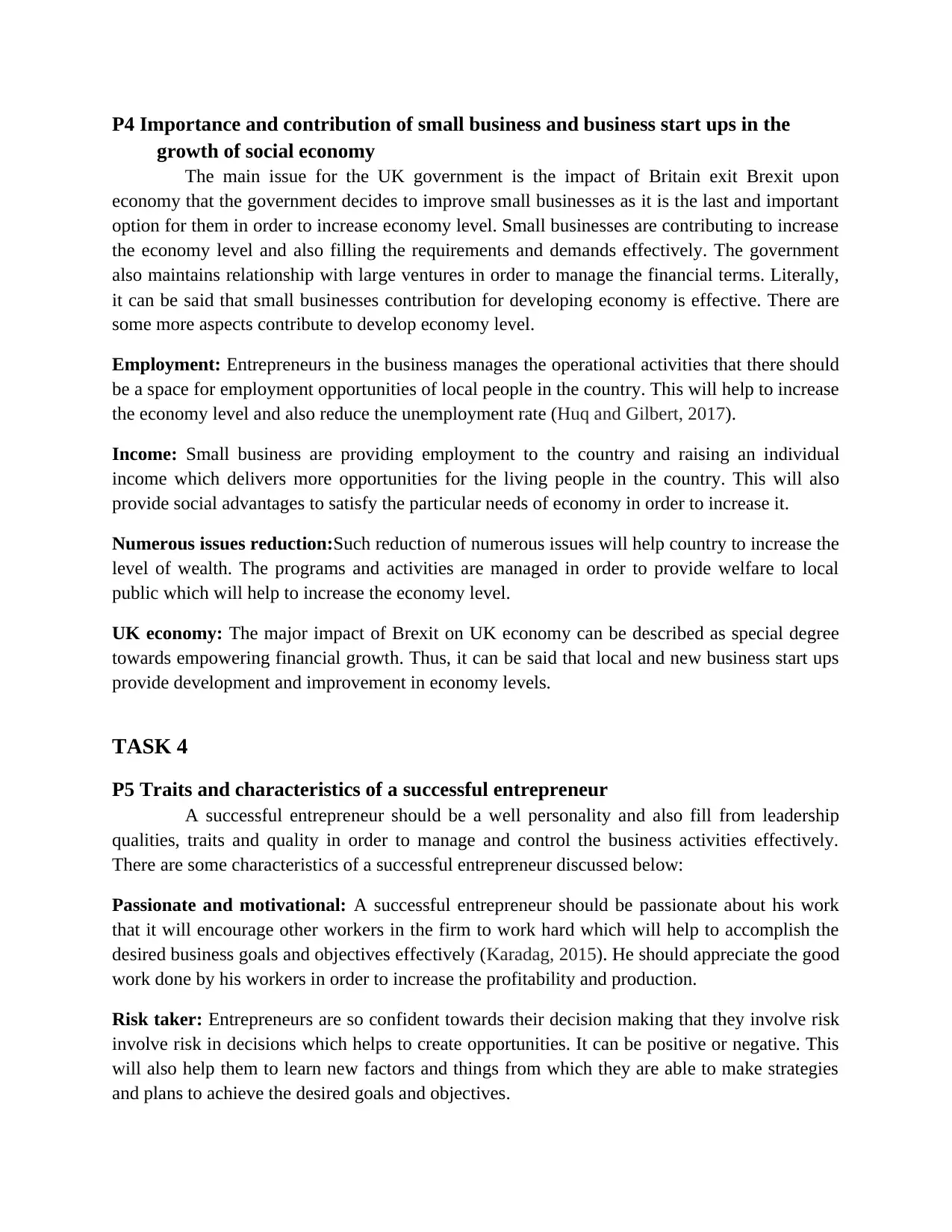
P4 Importance and contribution of small business and business start ups in the
growth of social economy
The main issue for the UK government is the impact of Britain exit Brexit upon
economy that the government decides to improve small businesses as it is the last and important
option for them in order to increase economy level. Small businesses are contributing to increase
the economy level and also filling the requirements and demands effectively. The government
also maintains relationship with large ventures in order to manage the financial terms. Literally,
it can be said that small businesses contribution for developing economy is effective. There are
some more aspects contribute to develop economy level.
Employment: Entrepreneurs in the business manages the operational activities that there should
be a space for employment opportunities of local people in the country. This will help to increase
the economy level and also reduce the unemployment rate (Huq and Gilbert, 2017).
Income: Small business are providing employment to the country and raising an individual
income which delivers more opportunities for the living people in the country. This will also
provide social advantages to satisfy the particular needs of economy in order to increase it.
Numerous issues reduction:Such reduction of numerous issues will help country to increase the
level of wealth. The programs and activities are managed in order to provide welfare to local
public which will help to increase the economy level.
UK economy: The major impact of Brexit on UK economy can be described as special degree
towards empowering financial growth. Thus, it can be said that local and new business start ups
provide development and improvement in economy levels.
TASK 4
P5 Traits and characteristics of a successful entrepreneur
A successful entrepreneur should be a well personality and also fill from leadership
qualities, traits and quality in order to manage and control the business activities effectively.
There are some characteristics of a successful entrepreneur discussed below:
Passionate and motivational: A successful entrepreneur should be passionate about his work
that it will encourage other workers in the firm to work hard which will help to accomplish the
desired business goals and objectives effectively (Karadag, 2015). He should appreciate the good
work done by his workers in order to increase the profitability and production.
Risk taker: Entrepreneurs are so confident towards their decision making that they involve risk
involve risk in decisions which helps to create opportunities. It can be positive or negative. This
will also help them to learn new factors and things from which they are able to make strategies
and plans to achieve the desired goals and objectives.
growth of social economy
The main issue for the UK government is the impact of Britain exit Brexit upon
economy that the government decides to improve small businesses as it is the last and important
option for them in order to increase economy level. Small businesses are contributing to increase
the economy level and also filling the requirements and demands effectively. The government
also maintains relationship with large ventures in order to manage the financial terms. Literally,
it can be said that small businesses contribution for developing economy is effective. There are
some more aspects contribute to develop economy level.
Employment: Entrepreneurs in the business manages the operational activities that there should
be a space for employment opportunities of local people in the country. This will help to increase
the economy level and also reduce the unemployment rate (Huq and Gilbert, 2017).
Income: Small business are providing employment to the country and raising an individual
income which delivers more opportunities for the living people in the country. This will also
provide social advantages to satisfy the particular needs of economy in order to increase it.
Numerous issues reduction:Such reduction of numerous issues will help country to increase the
level of wealth. The programs and activities are managed in order to provide welfare to local
public which will help to increase the economy level.
UK economy: The major impact of Brexit on UK economy can be described as special degree
towards empowering financial growth. Thus, it can be said that local and new business start ups
provide development and improvement in economy levels.
TASK 4
P5 Traits and characteristics of a successful entrepreneur
A successful entrepreneur should be a well personality and also fill from leadership
qualities, traits and quality in order to manage and control the business activities effectively.
There are some characteristics of a successful entrepreneur discussed below:
Passionate and motivational: A successful entrepreneur should be passionate about his work
that it will encourage other workers in the firm to work hard which will help to accomplish the
desired business goals and objectives effectively (Karadag, 2015). He should appreciate the good
work done by his workers in order to increase the profitability and production.
Risk taker: Entrepreneurs are so confident towards their decision making that they involve risk
involve risk in decisions which helps to create opportunities. It can be positive or negative. This
will also help them to learn new factors and things from which they are able to make strategies
and plans to achieve the desired goals and objectives.
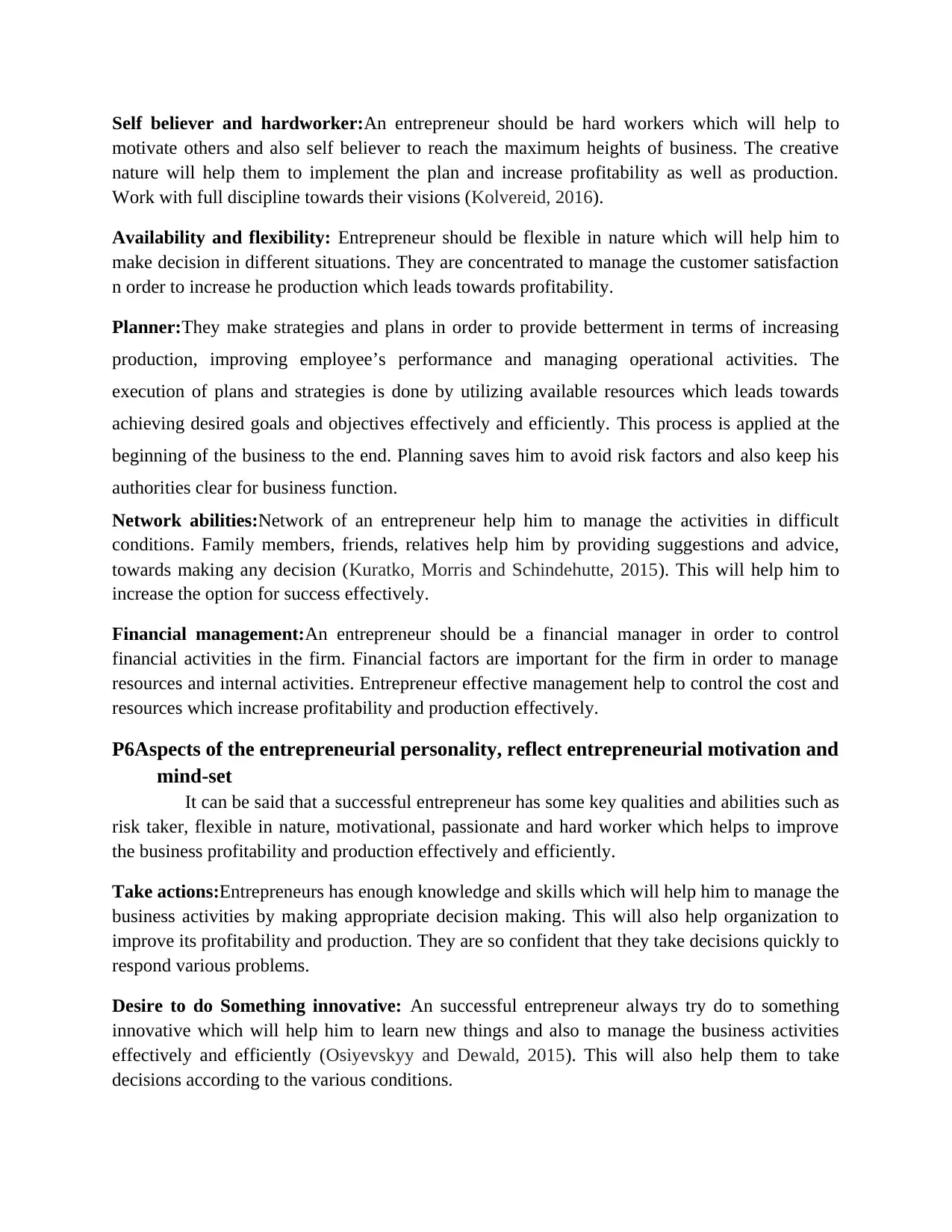
Self believer and hardworker:An entrepreneur should be hard workers which will help to
motivate others and also self believer to reach the maximum heights of business. The creative
nature will help them to implement the plan and increase profitability as well as production.
Work with full discipline towards their visions (Kolvereid, 2016).
Availability and flexibility: Entrepreneur should be flexible in nature which will help him to
make decision in different situations. They are concentrated to manage the customer satisfaction
n order to increase he production which leads towards profitability.
Planner:They make strategies and plans in order to provide betterment in terms of increasing
production, improving employee’s performance and managing operational activities. The
execution of plans and strategies is done by utilizing available resources which leads towards
achieving desired goals and objectives effectively and efficiently. This process is applied at the
beginning of the business to the end. Planning saves him to avoid risk factors and also keep his
authorities clear for business function.
Network abilities:Network of an entrepreneur help him to manage the activities in difficult
conditions. Family members, friends, relatives help him by providing suggestions and advice,
towards making any decision (Kuratko, Morris and Schindehutte, 2015). This will help him to
increase the option for success effectively.
Financial management:An entrepreneur should be a financial manager in order to control
financial activities in the firm. Financial factors are important for the firm in order to manage
resources and internal activities. Entrepreneur effective management help to control the cost and
resources which increase profitability and production effectively.
P6Aspects of the entrepreneurial personality, reflect entrepreneurial motivation and
mind-set
It can be said that a successful entrepreneur has some key qualities and abilities such as
risk taker, flexible in nature, motivational, passionate and hard worker which helps to improve
the business profitability and production effectively and efficiently.
Take actions:Entrepreneurs has enough knowledge and skills which will help him to manage the
business activities by making appropriate decision making. This will also help organization to
improve its profitability and production. They are so confident that they take decisions quickly to
respond various problems.
Desire to do Something innovative: An successful entrepreneur always try do to something
innovative which will help him to learn new things and also to manage the business activities
effectively and efficiently (Osiyevskyy and Dewald, 2015). This will also help them to take
decisions according to the various conditions.
motivate others and also self believer to reach the maximum heights of business. The creative
nature will help them to implement the plan and increase profitability as well as production.
Work with full discipline towards their visions (Kolvereid, 2016).
Availability and flexibility: Entrepreneur should be flexible in nature which will help him to
make decision in different situations. They are concentrated to manage the customer satisfaction
n order to increase he production which leads towards profitability.
Planner:They make strategies and plans in order to provide betterment in terms of increasing
production, improving employee’s performance and managing operational activities. The
execution of plans and strategies is done by utilizing available resources which leads towards
achieving desired goals and objectives effectively and efficiently. This process is applied at the
beginning of the business to the end. Planning saves him to avoid risk factors and also keep his
authorities clear for business function.
Network abilities:Network of an entrepreneur help him to manage the activities in difficult
conditions. Family members, friends, relatives help him by providing suggestions and advice,
towards making any decision (Kuratko, Morris and Schindehutte, 2015). This will help him to
increase the option for success effectively.
Financial management:An entrepreneur should be a financial manager in order to control
financial activities in the firm. Financial factors are important for the firm in order to manage
resources and internal activities. Entrepreneur effective management help to control the cost and
resources which increase profitability and production effectively.
P6Aspects of the entrepreneurial personality, reflect entrepreneurial motivation and
mind-set
It can be said that a successful entrepreneur has some key qualities and abilities such as
risk taker, flexible in nature, motivational, passionate and hard worker which helps to improve
the business profitability and production effectively and efficiently.
Take actions:Entrepreneurs has enough knowledge and skills which will help him to manage the
business activities by making appropriate decision making. This will also help organization to
improve its profitability and production. They are so confident that they take decisions quickly to
respond various problems.
Desire to do Something innovative: An successful entrepreneur always try do to something
innovative which will help him to learn new things and also to manage the business activities
effectively and efficiently (Osiyevskyy and Dewald, 2015). This will also help them to take
decisions according to the various conditions.
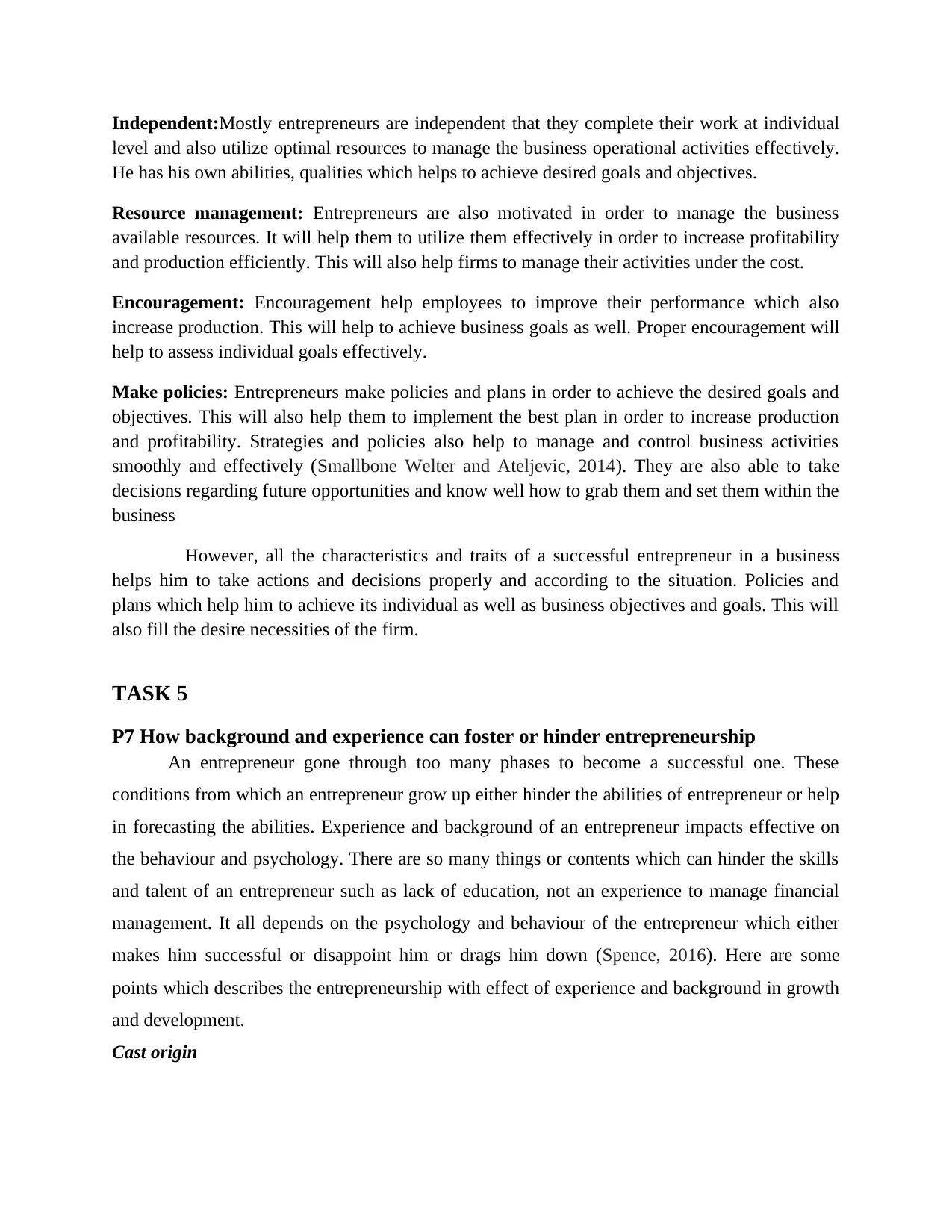
Independent:Mostly entrepreneurs are independent that they complete their work at individual
level and also utilize optimal resources to manage the business operational activities effectively.
He has his own abilities, qualities which helps to achieve desired goals and objectives.
Resource management: Entrepreneurs are also motivated in order to manage the business
available resources. It will help them to utilize them effectively in order to increase profitability
and production efficiently. This will also help firms to manage their activities under the cost.
Encouragement: Encouragement help employees to improve their performance which also
increase production. This will help to achieve business goals as well. Proper encouragement will
help to assess individual goals effectively.
Make policies: Entrepreneurs make policies and plans in order to achieve the desired goals and
objectives. This will also help them to implement the best plan in order to increase production
and profitability. Strategies and policies also help to manage and control business activities
smoothly and effectively (Smallbone Welter and Ateljevic, 2014). They are also able to take
decisions regarding future opportunities and know well how to grab them and set them within the
business
However, all the characteristics and traits of a successful entrepreneur in a business
helps him to take actions and decisions properly and according to the situation. Policies and
plans which help him to achieve its individual as well as business objectives and goals. This will
also fill the desire necessities of the firm.
TASK 5
P7 How background and experience can foster or hinder entrepreneurship
An entrepreneur gone through too many phases to become a successful one. These
conditions from which an entrepreneur grow up either hinder the abilities of entrepreneur or help
in forecasting the abilities. Experience and background of an entrepreneur impacts effective on
the behaviour and psychology. There are so many things or contents which can hinder the skills
and talent of an entrepreneur such as lack of education, not an experience to manage financial
management. It all depends on the psychology and behaviour of the entrepreneur which either
makes him successful or disappoint him or drags him down (Spence, 2016). Here are some
points which describes the entrepreneurship with effect of experience and background in growth
and development.
Cast origin
level and also utilize optimal resources to manage the business operational activities effectively.
He has his own abilities, qualities which helps to achieve desired goals and objectives.
Resource management: Entrepreneurs are also motivated in order to manage the business
available resources. It will help them to utilize them effectively in order to increase profitability
and production efficiently. This will also help firms to manage their activities under the cost.
Encouragement: Encouragement help employees to improve their performance which also
increase production. This will help to achieve business goals as well. Proper encouragement will
help to assess individual goals effectively.
Make policies: Entrepreneurs make policies and plans in order to achieve the desired goals and
objectives. This will also help them to implement the best plan in order to increase production
and profitability. Strategies and policies also help to manage and control business activities
smoothly and effectively (Smallbone Welter and Ateljevic, 2014). They are also able to take
decisions regarding future opportunities and know well how to grab them and set them within the
business
However, all the characteristics and traits of a successful entrepreneur in a business
helps him to take actions and decisions properly and according to the situation. Policies and
plans which help him to achieve its individual as well as business objectives and goals. This will
also fill the desire necessities of the firm.
TASK 5
P7 How background and experience can foster or hinder entrepreneurship
An entrepreneur gone through too many phases to become a successful one. These
conditions from which an entrepreneur grow up either hinder the abilities of entrepreneur or help
in forecasting the abilities. Experience and background of an entrepreneur impacts effective on
the behaviour and psychology. There are so many things or contents which can hinder the skills
and talent of an entrepreneur such as lack of education, not an experience to manage financial
management. It all depends on the psychology and behaviour of the entrepreneur which either
makes him successful or disappoint him or drags him down (Spence, 2016). Here are some
points which describes the entrepreneurship with effect of experience and background in growth
and development.
Cast origin
Secure Best Marks with AI Grader
Need help grading? Try our AI Grader for instant feedback on your assignments.
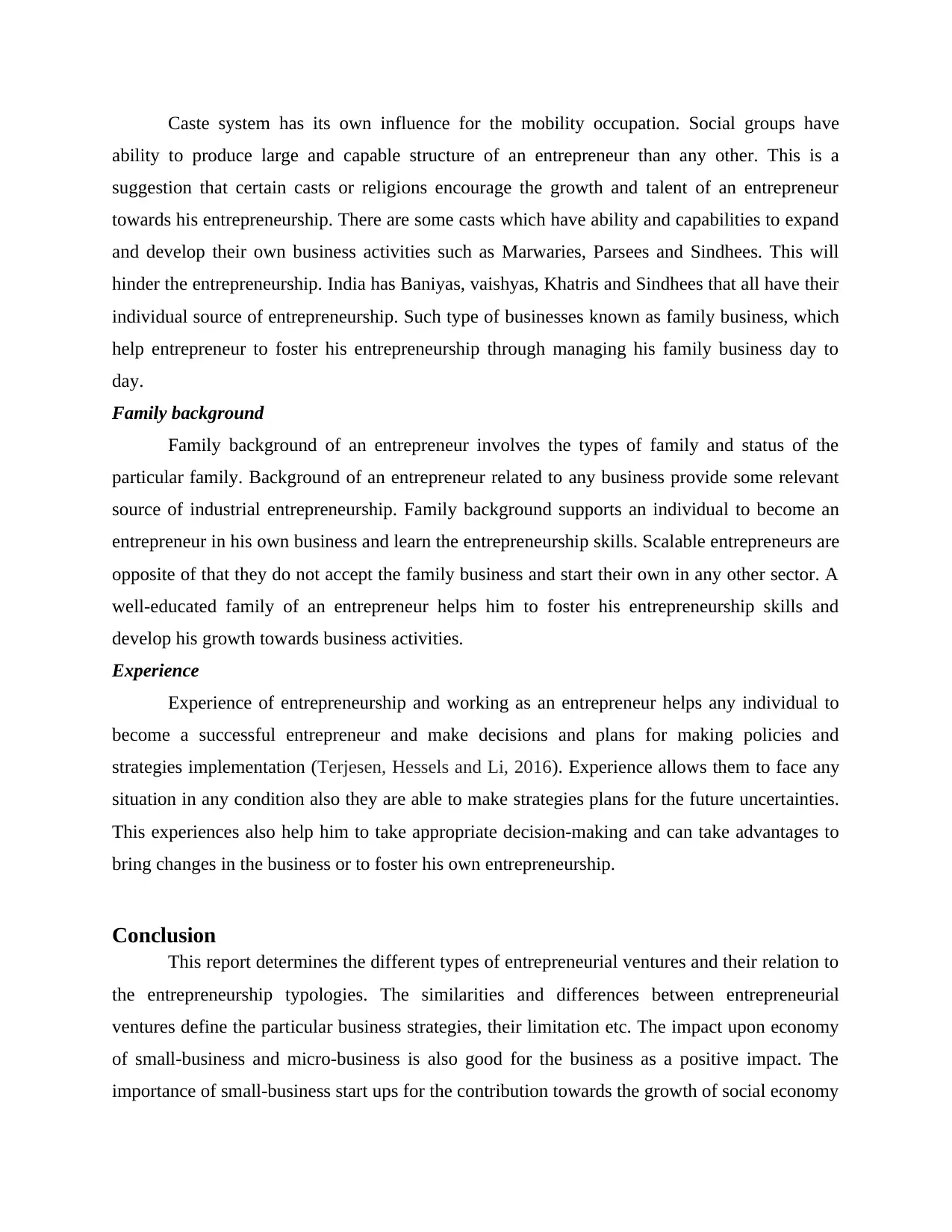
Caste system has its own influence for the mobility occupation. Social groups have
ability to produce large and capable structure of an entrepreneur than any other. This is a
suggestion that certain casts or religions encourage the growth and talent of an entrepreneur
towards his entrepreneurship. There are some casts which have ability and capabilities to expand
and develop their own business activities such as Marwaries, Parsees and Sindhees. This will
hinder the entrepreneurship. India has Baniyas, vaishyas, Khatris and Sindhees that all have their
individual source of entrepreneurship. Such type of businesses known as family business, which
help entrepreneur to foster his entrepreneurship through managing his family business day to
day.
Family background
Family background of an entrepreneur involves the types of family and status of the
particular family. Background of an entrepreneur related to any business provide some relevant
source of industrial entrepreneurship. Family background supports an individual to become an
entrepreneur in his own business and learn the entrepreneurship skills. Scalable entrepreneurs are
opposite of that they do not accept the family business and start their own in any other sector. A
well-educated family of an entrepreneur helps him to foster his entrepreneurship skills and
develop his growth towards business activities.
Experience
Experience of entrepreneurship and working as an entrepreneur helps any individual to
become a successful entrepreneur and make decisions and plans for making policies and
strategies implementation (Terjesen, Hessels and Li, 2016). Experience allows them to face any
situation in any condition also they are able to make strategies plans for the future uncertainties.
This experiences also help him to take appropriate decision-making and can take advantages to
bring changes in the business or to foster his own entrepreneurship.
Conclusion
This report determines the different types of entrepreneurial ventures and their relation to
the entrepreneurship typologies. The similarities and differences between entrepreneurial
ventures define the particular business strategies, their limitation etc. The impact upon economy
of small-business and micro-business is also good for the business as a positive impact. The
importance of small-business start ups for the contribution towards the growth of social economy
ability to produce large and capable structure of an entrepreneur than any other. This is a
suggestion that certain casts or religions encourage the growth and talent of an entrepreneur
towards his entrepreneurship. There are some casts which have ability and capabilities to expand
and develop their own business activities such as Marwaries, Parsees and Sindhees. This will
hinder the entrepreneurship. India has Baniyas, vaishyas, Khatris and Sindhees that all have their
individual source of entrepreneurship. Such type of businesses known as family business, which
help entrepreneur to foster his entrepreneurship through managing his family business day to
day.
Family background
Family background of an entrepreneur involves the types of family and status of the
particular family. Background of an entrepreneur related to any business provide some relevant
source of industrial entrepreneurship. Family background supports an individual to become an
entrepreneur in his own business and learn the entrepreneurship skills. Scalable entrepreneurs are
opposite of that they do not accept the family business and start their own in any other sector. A
well-educated family of an entrepreneur helps him to foster his entrepreneurship skills and
develop his growth towards business activities.
Experience
Experience of entrepreneurship and working as an entrepreneur helps any individual to
become a successful entrepreneur and make decisions and plans for making policies and
strategies implementation (Terjesen, Hessels and Li, 2016). Experience allows them to face any
situation in any condition also they are able to make strategies plans for the future uncertainties.
This experiences also help him to take appropriate decision-making and can take advantages to
bring changes in the business or to foster his own entrepreneurship.
Conclusion
This report determines the different types of entrepreneurial ventures and their relation to
the entrepreneurship typologies. The similarities and differences between entrepreneurial
ventures define the particular business strategies, their limitation etc. The impact upon economy
of small-business and micro-business is also good for the business as a positive impact. The
importance of small-business start ups for the contribution towards the growth of social economy
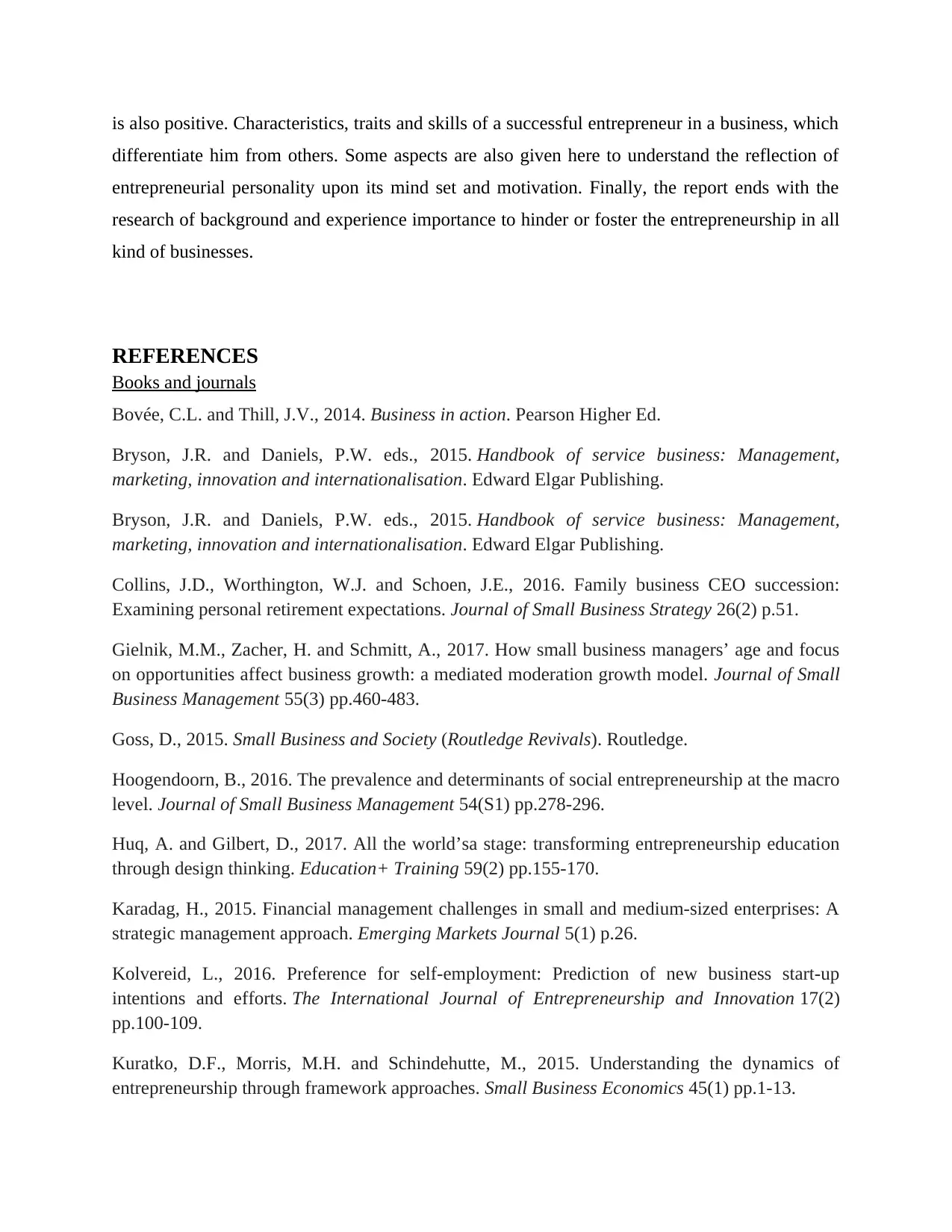
is also positive. Characteristics, traits and skills of a successful entrepreneur in a business, which
differentiate him from others. Some aspects are also given here to understand the reflection of
entrepreneurial personality upon its mind set and motivation. Finally, the report ends with the
research of background and experience importance to hinder or foster the entrepreneurship in all
kind of businesses.
REFERENCES
Books and journals
Bovée, C.L. and Thill, J.V., 2014. Business in action. Pearson Higher Ed.
Bryson, J.R. and Daniels, P.W. eds., 2015. Handbook of service business: Management,
marketing, innovation and internationalisation. Edward Elgar Publishing.
Bryson, J.R. and Daniels, P.W. eds., 2015. Handbook of service business: Management,
marketing, innovation and internationalisation. Edward Elgar Publishing.
Collins, J.D., Worthington, W.J. and Schoen, J.E., 2016. Family business CEO succession:
Examining personal retirement expectations. Journal of Small Business Strategy 26(2) p.51.
Gielnik, M.M., Zacher, H. and Schmitt, A., 2017. How small business managers’ age and focus
on opportunities affect business growth: a mediated moderation growth model. Journal of Small
Business Management 55(3) pp.460-483.
Goss, D., 2015. Small Business and Society (Routledge Revivals). Routledge.
Hoogendoorn, B., 2016. The prevalence and determinants of social entrepreneurship at the macro
level. Journal of Small Business Management 54(S1) pp.278-296.
Huq, A. and Gilbert, D., 2017. All the world’sa stage: transforming entrepreneurship education
through design thinking. Education+ Training 59(2) pp.155-170.
Karadag, H., 2015. Financial management challenges in small and medium-sized enterprises: A
strategic management approach. Emerging Markets Journal 5(1) p.26.
Kolvereid, L., 2016. Preference for self-employment: Prediction of new business start-up
intentions and efforts. The International Journal of Entrepreneurship and Innovation 17(2)
pp.100-109.
Kuratko, D.F., Morris, M.H. and Schindehutte, M., 2015. Understanding the dynamics of
entrepreneurship through framework approaches. Small Business Economics 45(1) pp.1-13.
differentiate him from others. Some aspects are also given here to understand the reflection of
entrepreneurial personality upon its mind set and motivation. Finally, the report ends with the
research of background and experience importance to hinder or foster the entrepreneurship in all
kind of businesses.
REFERENCES
Books and journals
Bovée, C.L. and Thill, J.V., 2014. Business in action. Pearson Higher Ed.
Bryson, J.R. and Daniels, P.W. eds., 2015. Handbook of service business: Management,
marketing, innovation and internationalisation. Edward Elgar Publishing.
Bryson, J.R. and Daniels, P.W. eds., 2015. Handbook of service business: Management,
marketing, innovation and internationalisation. Edward Elgar Publishing.
Collins, J.D., Worthington, W.J. and Schoen, J.E., 2016. Family business CEO succession:
Examining personal retirement expectations. Journal of Small Business Strategy 26(2) p.51.
Gielnik, M.M., Zacher, H. and Schmitt, A., 2017. How small business managers’ age and focus
on opportunities affect business growth: a mediated moderation growth model. Journal of Small
Business Management 55(3) pp.460-483.
Goss, D., 2015. Small Business and Society (Routledge Revivals). Routledge.
Hoogendoorn, B., 2016. The prevalence and determinants of social entrepreneurship at the macro
level. Journal of Small Business Management 54(S1) pp.278-296.
Huq, A. and Gilbert, D., 2017. All the world’sa stage: transforming entrepreneurship education
through design thinking. Education+ Training 59(2) pp.155-170.
Karadag, H., 2015. Financial management challenges in small and medium-sized enterprises: A
strategic management approach. Emerging Markets Journal 5(1) p.26.
Kolvereid, L., 2016. Preference for self-employment: Prediction of new business start-up
intentions and efforts. The International Journal of Entrepreneurship and Innovation 17(2)
pp.100-109.
Kuratko, D.F., Morris, M.H. and Schindehutte, M., 2015. Understanding the dynamics of
entrepreneurship through framework approaches. Small Business Economics 45(1) pp.1-13.
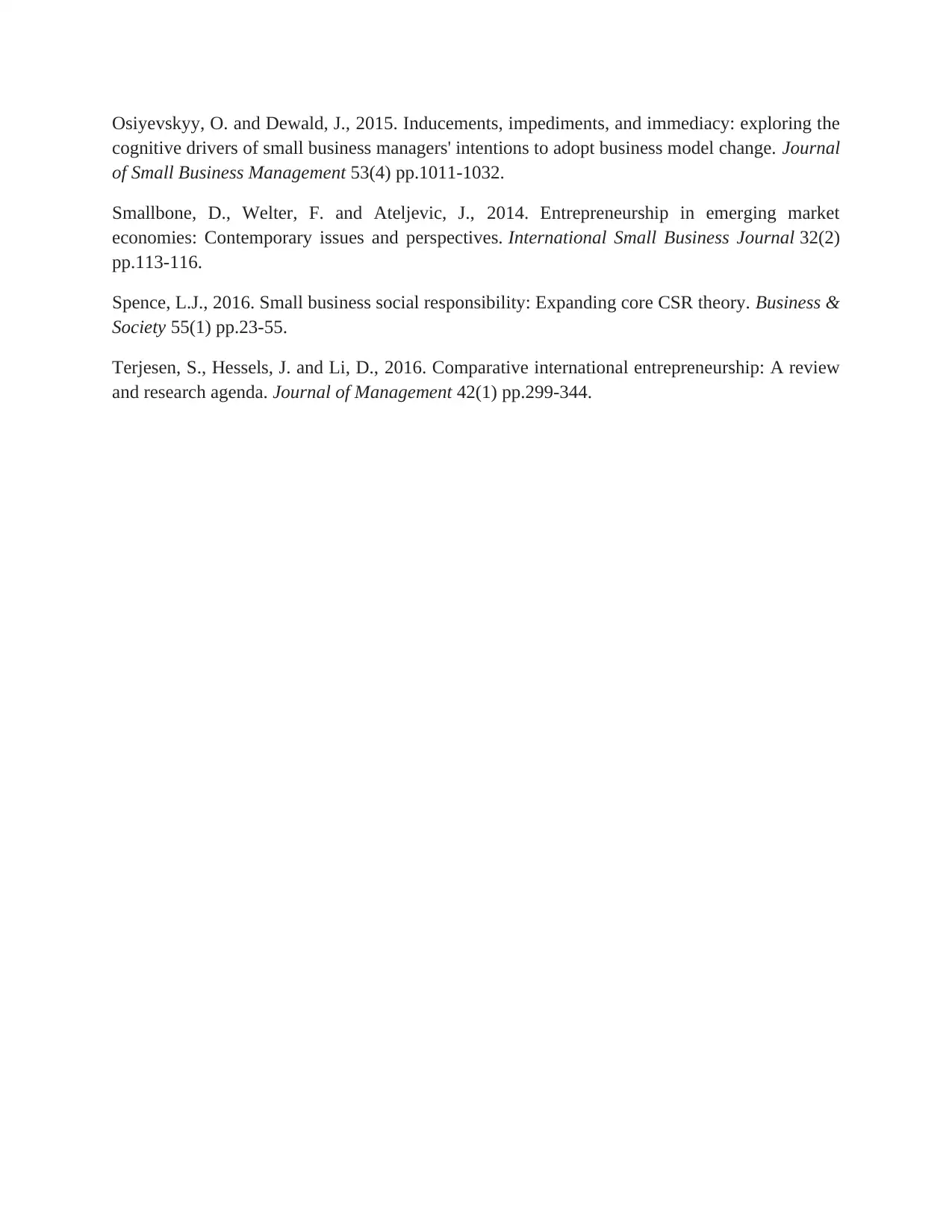
Osiyevskyy, O. and Dewald, J., 2015. Inducements, impediments, and immediacy: exploring the
cognitive drivers of small business managers' intentions to adopt business model change. Journal
of Small Business Management 53(4) pp.1011-1032.
Smallbone, D., Welter, F. and Ateljevic, J., 2014. Entrepreneurship in emerging market
economies: Contemporary issues and perspectives. International Small Business Journal 32(2)
pp.113-116.
Spence, L.J., 2016. Small business social responsibility: Expanding core CSR theory. Business &
Society 55(1) pp.23-55.
Terjesen, S., Hessels, J. and Li, D., 2016. Comparative international entrepreneurship: A review
and research agenda. Journal of Management 42(1) pp.299-344.
cognitive drivers of small business managers' intentions to adopt business model change. Journal
of Small Business Management 53(4) pp.1011-1032.
Smallbone, D., Welter, F. and Ateljevic, J., 2014. Entrepreneurship in emerging market
economies: Contemporary issues and perspectives. International Small Business Journal 32(2)
pp.113-116.
Spence, L.J., 2016. Small business social responsibility: Expanding core CSR theory. Business &
Society 55(1) pp.23-55.
Terjesen, S., Hessels, J. and Li, D., 2016. Comparative international entrepreneurship: A review
and research agenda. Journal of Management 42(1) pp.299-344.
1 out of 13
Related Documents
Your All-in-One AI-Powered Toolkit for Academic Success.
+13062052269
info@desklib.com
Available 24*7 on WhatsApp / Email
![[object Object]](/_next/static/media/star-bottom.7253800d.svg)
Unlock your academic potential
© 2024 | Zucol Services PVT LTD | All rights reserved.





